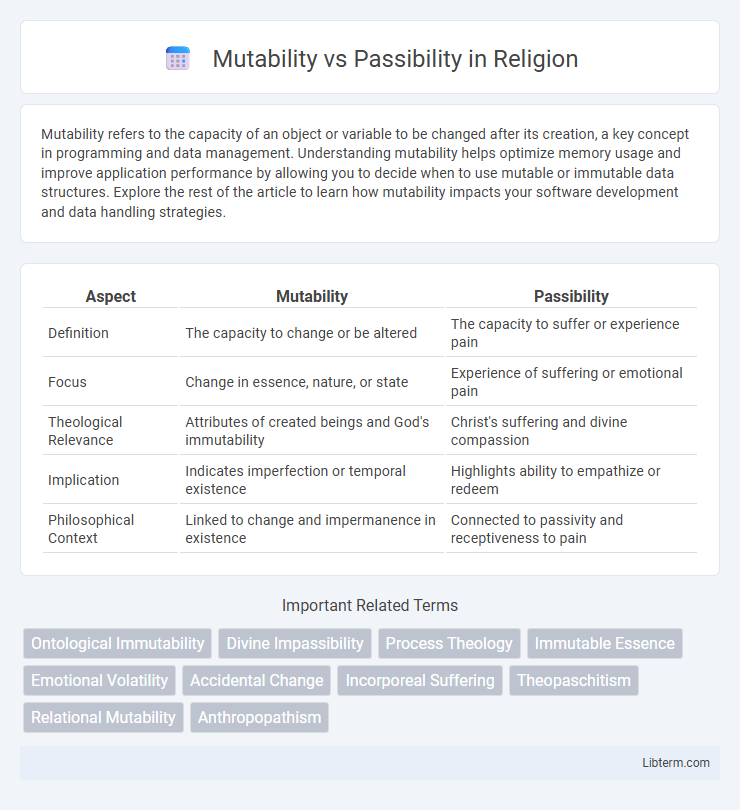Mutability refers to the capacity of an object or variable to be changed after its creation, a key concept in programming and data management. Understanding mutability helps optimize memory usage and improve application performance by allowing you to decide when to use mutable or immutable data structures. Explore the rest of the article to learn how mutability impacts your software development and data handling strategies.
Table of Comparison
| Aspect | Mutability | Passibility |
|---|---|---|
| Definition | The capacity to change or be altered | The capacity to suffer or experience pain |
| Focus | Change in essence, nature, or state | Experience of suffering or emotional pain |
| Theological Relevance | Attributes of created beings and God's immutability | Christ's suffering and divine compassion |
| Implication | Indicates imperfection or temporal existence | Highlights ability to empathize or redeem |
| Philosophical Context | Linked to change and impermanence in existence | Connected to passivity and receptiveness to pain |
Understanding Mutability and Passibility
Mutability refers to the capacity of an object or entity to undergo change or transformation while retaining its identity, playing a crucial role in dynamic systems and programming languages. Passibility, in contrast, denotes the susceptibility to suffering or being affected by external forces, often linked to emotional or physical responsiveness. Understanding mutability and passibility helps clarify concepts in philosophy, theology, and computer science by distinguishing between changeability and sensitivity to influence.
Key Differences Between Mutability and Passibility
Mutability refers to the capacity of an entity to undergo change or alteration, emphasizing its dynamic and adaptable nature. Passibility, in contrast, highlights the susceptibility or capacity of an entity to be affected, harmed, or influenced by external forces or conditions. The key difference lies in mutability denoting active changeability, while passibility signifies passive responsiveness or vulnerability to external impacts.
Theological Foundations of Mutability
Mutability in theology refers to the capacity for change or alteration within a being, often applied to God's attributes or nature. Theological foundations emphasize that God's essential nature is immutable, reflecting perfection, eternity, and unchanging truth, as outlined in classical theism and biblical doctrines such as Malachi 3:6. This immutability distinguishes God's divine essence from created beings, who possess passibility, or susceptibility to change, suffering, and temporal limitations.
Philosophical Roots of Passibility
Passibility originates from Aristotelian and Scholastic traditions, emphasizing the capacity to undergo change or suffering as a fundamental aspect of being. This concept contrasts with mutability, which denotes a general tendency to change, as passibility specifically highlights an entity's susceptibility to external influences or harm. Philosophers like Aquinas advanced passibility to explain the interplay between perfection and imperfection within living beings, affirming that the ability to experience passivity is essential for understanding existence and moral responsibility.
Mutability in Classical Theism
In Classical Theism, mutability refers to the capacity for change or alteration, which contrasts sharply with the concept of divine immutability, the belief that God is unchanging in essence, attributes, and will. Philosophers like Aquinas argue that while creatures are inherently mutable, God's nature remains eternally constant, highlighting a fundamental difference between the Creator and creation. Mutability implies potentiality and temporal succession, emphasizing the contingent and finite nature of all beings except the immutable divine.
Passibility in Modern Theology
Passibility in modern theology emphasizes God's capacity to experience suffering and change, aligning with process theology and open theism perspectives that reject classical impassibility. This concept challenges traditional views of divine immutability by proposing that God is relationally affected by creation, enhancing theological understandings of divine empathy and responsiveness. Scholars such as Jurgen Moltmann and Marilyn McCord Adams advocate for passibility to portray a dynamic God who participates intimately in human suffering and history.
Scriptural Perspectives on Divine Change
Scriptural perspectives on divine change distinguish between mutability, implying alteration in God's essence, and passibility, which suggests susceptibility to external influences or suffering. Biblical texts often affirm God's immutability, emphasizing His unchanging nature as seen in Malachi 3:6 and James 1:17, where God's essence and promises remain constant. However, passages portraying God's emotional responses, such as in Genesis 6:6 and Exodus 32:14, reveal a complex portrayal that accommodates relational responsiveness without compromising divine immutability.
Impact on Divine Attributes
Mutability challenges the notion of divine immutability by suggesting that God can undergo change, which raises questions about the consistency of divine attributes such as omniscience and omnipotence. Passibility implies that God can experience suffering or emotions, potentially affecting divine impassibility and the perception of divine perfection. These concepts impact theological understandings of God's nature, influencing doctrines related to grace, mercy, and interaction with creation.
Relevance to Contemporary Debates
Mutability and passibility are central to contemporary debates in philosophy and theology, especially regarding the nature of divine attributes and human experience. Mutability pertains to the capacity for change, influencing discussions on whether divine beings can experience temporal alterations without compromising their perfection. Passibility, the ability to suffer or be affected, challenges classical notions of impassible divinity, impacting ethical considerations and human empathy in modern theological discourse.
Conclusion: Navigating Mutability and Passibility
Navigating the balance between mutability and passibility requires understanding their impact on system design and user experience. Mutability enhances flexibility and real-time data updates, while passibility ensures stability and predictability in data handling. Optimal application depends on context-specific requirements, prioritizing either dynamic responsiveness or consistency in state management.
Mutability Infographic

 libterm.com
libterm.com